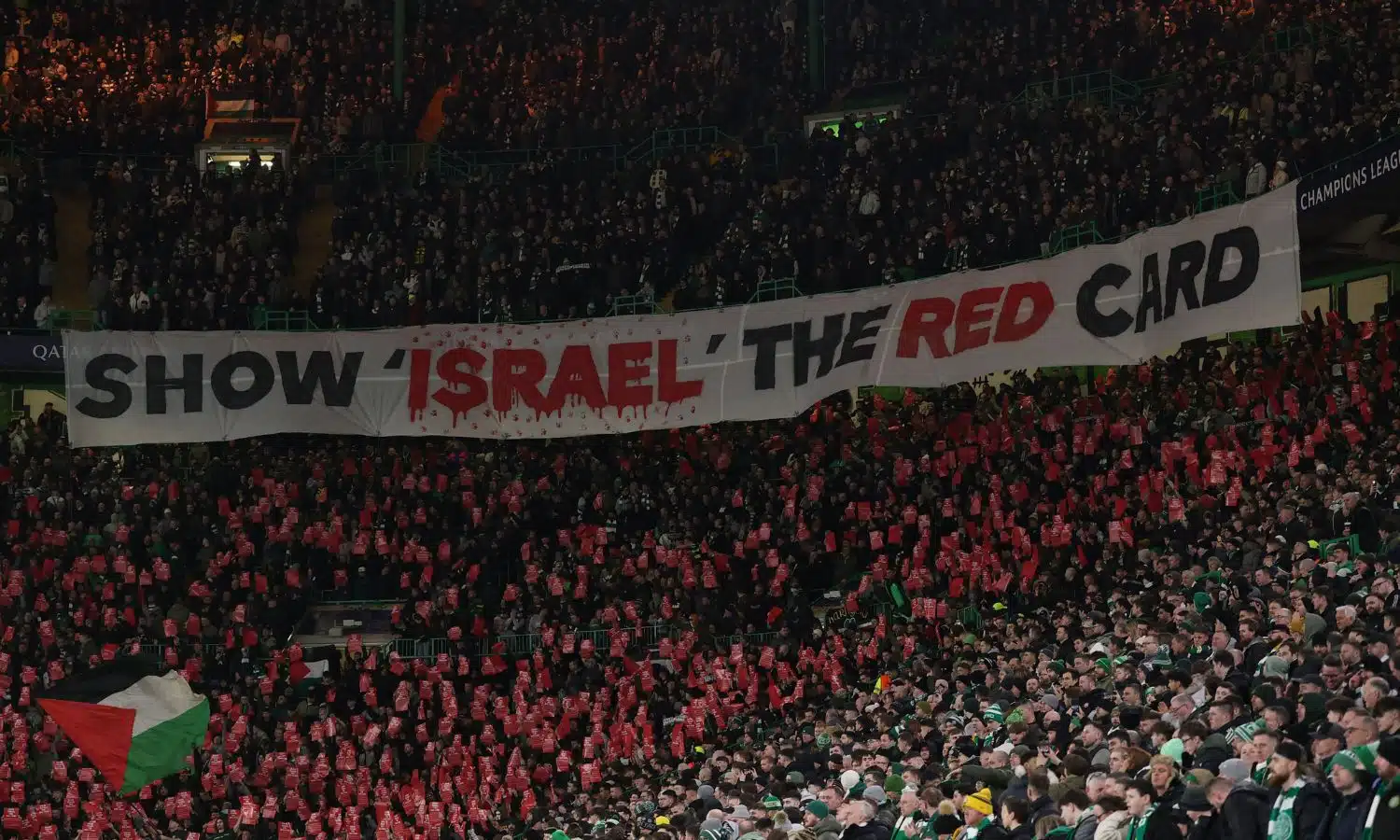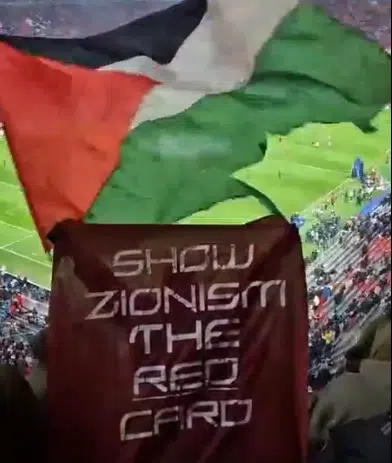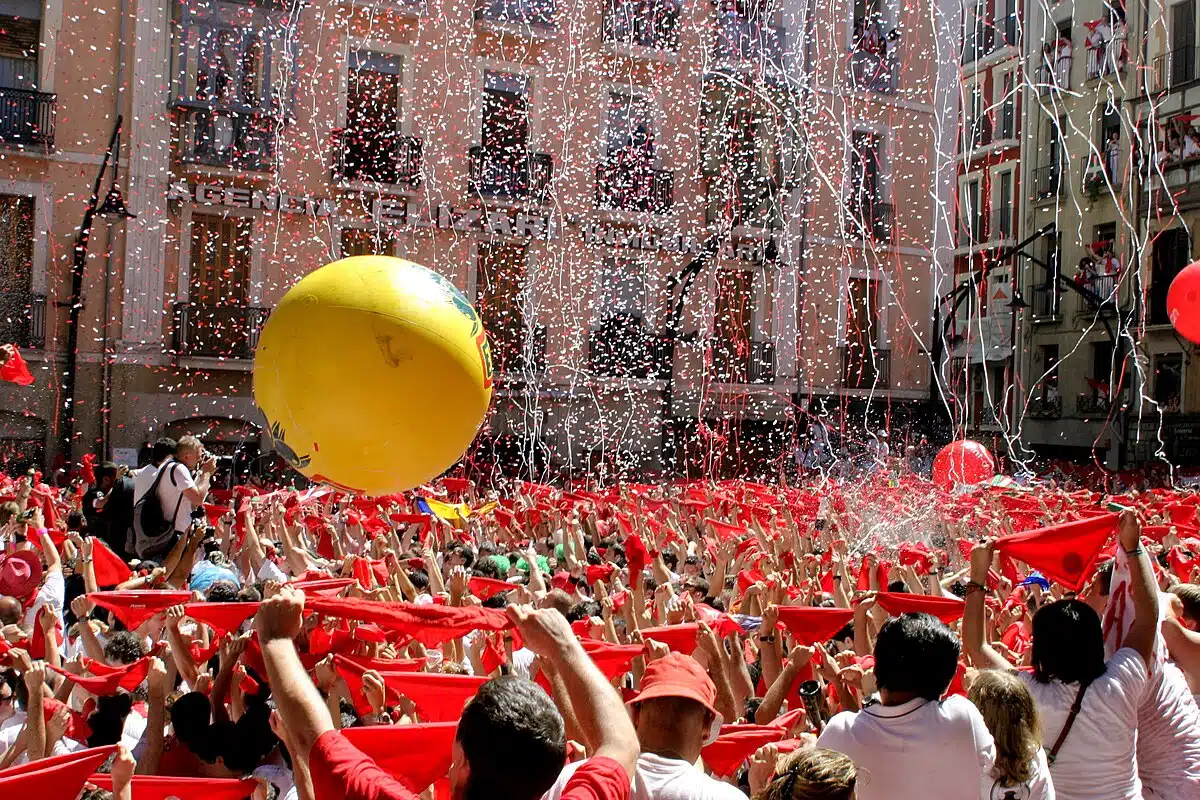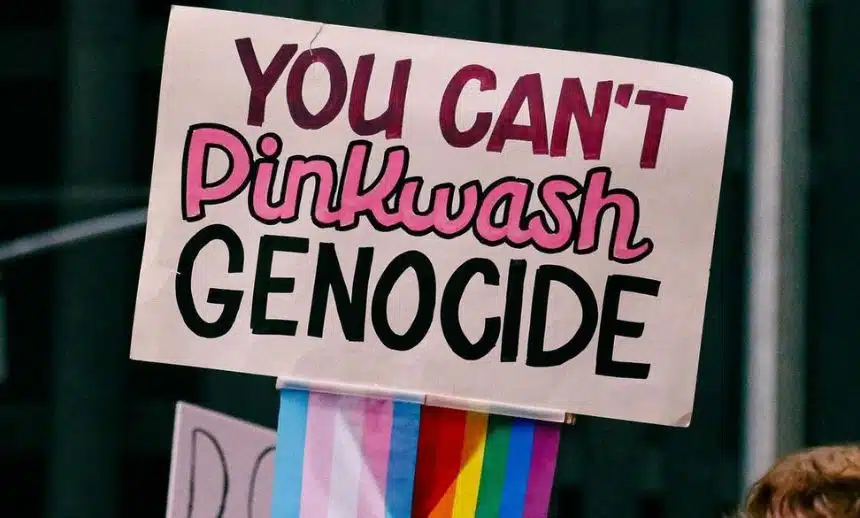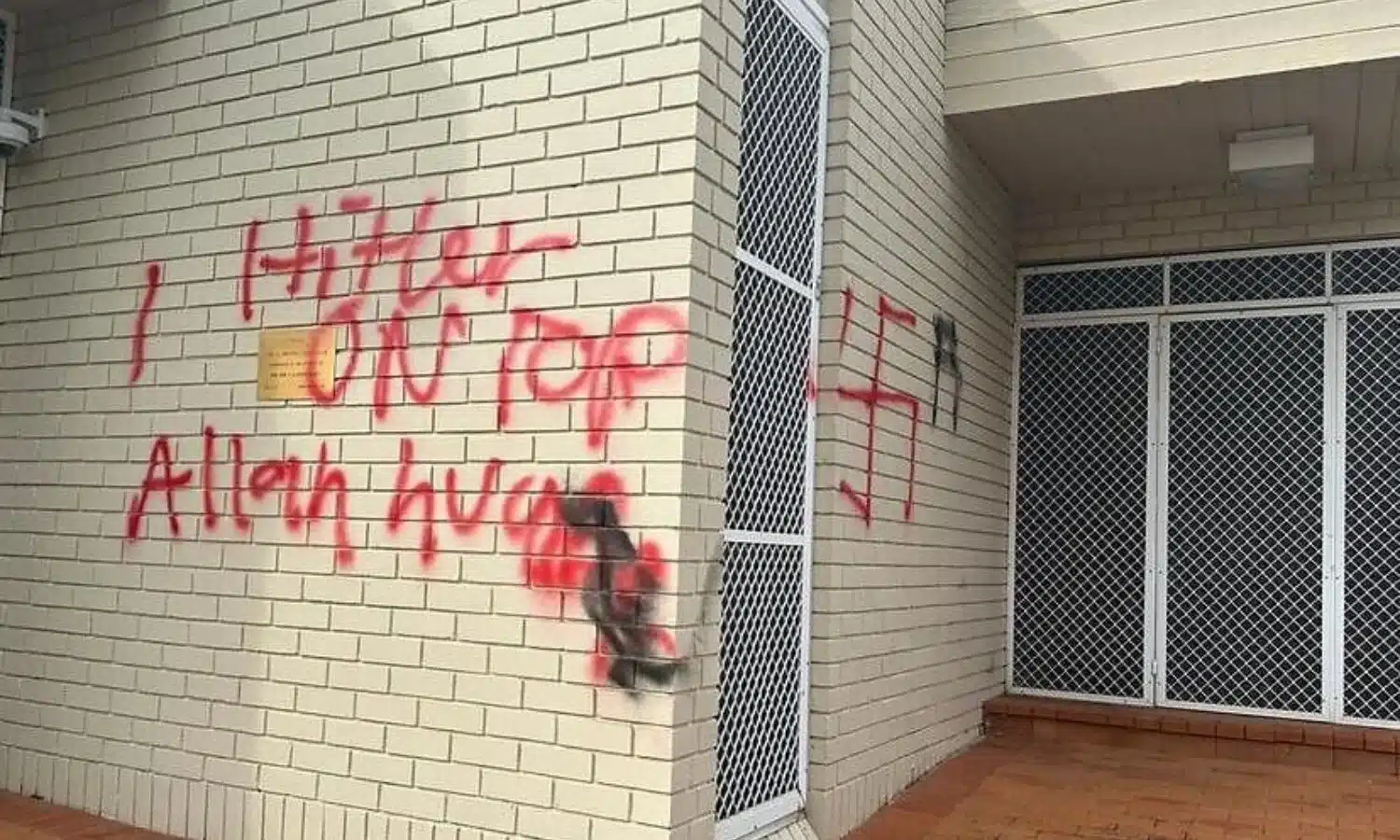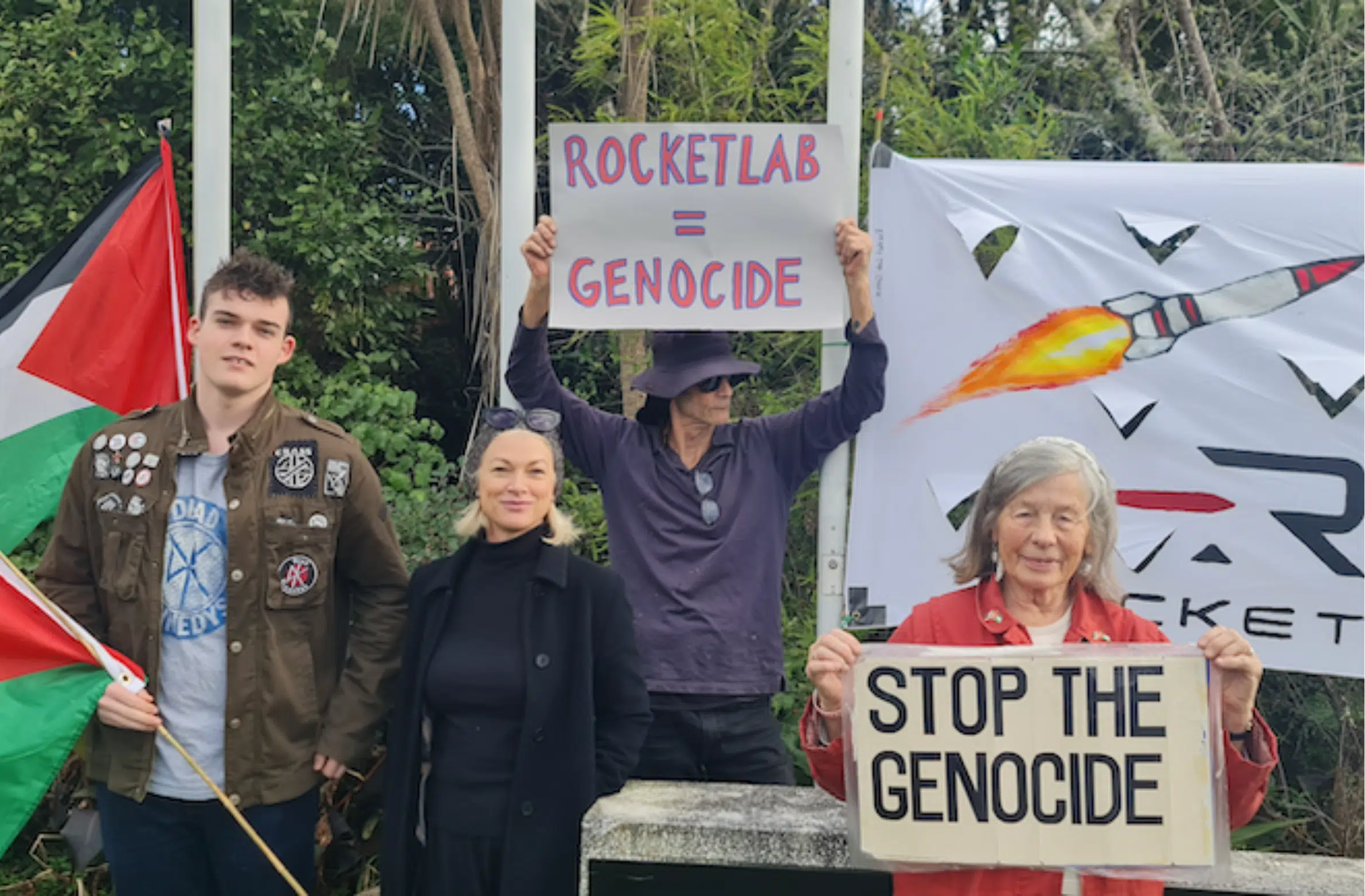|
Getting your Trinity Audio player ready...
|
Recent weeks have seen an upsurge of manifestations of antisemitic hatred at soccer stadiums worldwide, with the launch of the “Show Israel the Red Card” campaign calling for the boycotting of Israeli teams and athletes from international competition.
According to the anti-Israel media outlet Middle East Eye, Celtic Football Club fans initiated the campaign on February 12, passing out flyers at a home match in Glasgow against Bayern Munich saying:
At the start of the second half, please Show ‘Israel’ the Red Card to send a direct message to UEFA (Union of European Football Associations) and FIFA (International Federation of Association Football) to apply their respective statutes and suspend “Israel” from competition. By doing so, you will not only be doing the right thing but you will be joining football fans of conscience and courage around the world who will be adopting the same message.
The Antisemitism Research Center (ARC) by CAM recorded several subsequent incidents inspired by this hateful call to action:
- March 3, 2025: Fans attending a match at Dalymount Park in Dublin, Ireland, displayed a banner reading, “Show Israel the Red Card.” (Source)
- March 1, 2025: Fans attending a match in Madrid, Spain, displayed a banner reading, “Show Israel the Red Card.” (Source)
- February 28, 2025: High school students in Turin, Italy, displayed a sign reading, “Show Israel the Red Card.” (Source)
- February 22, 2025: During a match in Edinburgh, Scotland, fans held signs reading, “Show Israeli Genocide the Red Card.” (Source)
- February 22, 2025: Celtic Football Club fans in Detroit, Michigan, hung a sign in a bar reading, “Show ‘Israel’ the Red Card.” (Source)
- February 22, 2025: Deportivo Alavés fans in Vitoria-Gasteiz, Spain. held red cards targeting Israel. (Source)
- February 19, 2025: Fans at a match between Celtic and Bayern Munich at Celtic Park in Glasgow, Scotland, displayed a banner reading, “Show Zionism the Red Card.” (Source)
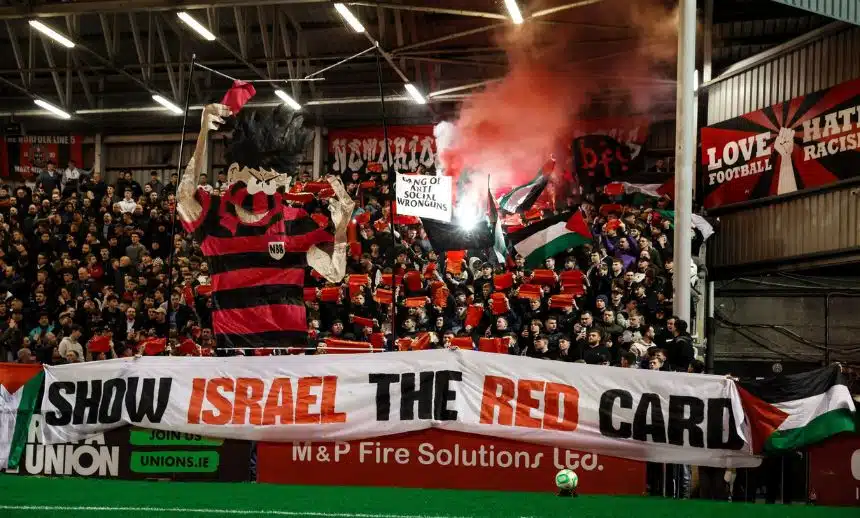
In a post promoting a “Show ‘Israel’ the Red Card” banner displayed in Malaysia, Iran’s state-run Islamic Republic News Agency (IRNA) claimed on X on February 26 that “spectators of 72 clubs have thus far showed [sic] red cards to [Israel]” in 30 countries. Middle East Eye reported additional “red card” displays in France, Greece, and Turkey.
Far from an innocuous protest, this campaign promotes an antisemitic cause marked by both violent imagery and rhetoric, as well as brazen double standards against Israel.
On the banner displayed in Malaysia, for example, the word “Israel” was written in red with streaks dripping off the letters, meant to evoke blood. Such imagery is a contemporary manifestation of the blood libel, a millennia-old antisemitic lie that Jews consume the blood of Christian children. Frequently, the contemporary iteration merely substitutes Christian children with Palestinian children and Jews writ large with Israel, advancing the lie that the Jewish state harbors an unquenchable blood lust.
Furthermore, several banners displayed the word “Israel” in quotation marks, implying that the Jewish state is not real, or is illegitimate. Accusations or implications that Israel is fake or artificial are outgrowths of the antisemitic view that Jewish connection to the Land of Israel is inauthentic, contrary to factual reality. By attempting to negate Jewish historical, religious, and cultural connection to their homeland, Israel’s detractors are committing an act of erasure in the vain hope of undermining the Jewish right to self-determination.
Banners reading “Show Zionism the Red Card” are also meant to delegitimize Israel, and Jewish people globally, implying that Zionism should be “thrown out” or “ejected.” Practically, this amounts to advocacy for the elimination of Israel, a call made against no other nation in the world. Such a double standard is plainly antisemitic. The International Holocaust Remembrance Alliance’s (IHRA) Working Definition of Antisemitism lists “Denying the Jewish people their right to self-determination, e.g., by claiming that the existence of a State of Israel is a racist endeavor” as a contemporary example of Jew-hatred.
Beyond the antisemitic imagery and rhetoric, agitators calling to ban Israel from international sporting bodies would hold the Jewish state to a standard to which no other country, democratic or otherwise, is subjected. One sports journalist noted that FIFA has only banned 17 countries from its prestigious quadrennial World Cup tournament since 1950, the vast majority for reasons unrelated to a country’s political affairs, whether domestic or international.
Only four have been treated otherwise, including: Germany and Japan in 1950, in the aftermath of World War II; South Africa from 1970-1990 due to its apartheid practices; and Russia starting in 2022 due to its invasion of Ukraine. Each of these countries was — or, in the case of Russia, still is — a non-democratic regime at the time of their transgressions. World War II-era Germany and Japan were genocidal regimes whose aggression plunged the world into the deadliest conflict ever seen, and Russia’s invasion of Ukraine in 2022 marked the beginning of the largest European war since that dark time.
The Celtic Football Club fans who initiated the “red card” campaign and their emulators would place Israel in the same camp — an absurd characterization meant to distort the nature of Israel’s post-October 7th military campaign in Gaza. Far from a “genocidal” onslaught, as some “red card” demonstrators claim, Israel’s objective in Gaza is to destroy Hamas and free the hostages the antisemitic, Iran-backed terrorist group seized during the October 7th attack, the deadliest single-day massacre of Jews since the Holocaust.
No other democratic state battling terrorism, whether the United States in Afghanistan or France in the Sahel, has ever faced such a widespread campaign to exclude it from sporting events, let alone to paint its self-defensive military efforts as “genocidal.” The “red card” campaign’s prominence even as Israel mourns its dead murdered by Hamas and is forced to witness the group’s grotesque hostage release ceremonies underscores the deep-seated hatred driving it.
Boycott campaigns designed to marginalize Israel, and the global Jewish community writ large, are unfortunately not new. As early as 1945, three years before Israel’s founding, the Arab League organized a boycott of Jewish-made goods in the British-controlled Palestine Mandate territory. Today’s terrorist-linked Boycott, Divest, Sanctions (BDS) movement similarly urges economic warfare against Israel until it acquiesces to policies that would amount to its demise.
Historically, efforts to exclude Israelis from sporting competitions have been part and parcel of anti-Israel boycott efforts. Indeed, an entire section of the BDS movement’s website is titled, “Ban Apartheid Israel From Sports.” In the 1970s, Israel faced expulsion from the Asian Football Confederation because participating nations refused to compete against Israeli teams. In 2013, the “Red Card Israeli Racism” group sought to pressure UEFA to reverse the decision for Israel to host an upcoming tournament. Israeli judo athletes frequently encounter either signs of disrespect and boycotts as opponents either refuse to shake hands after matches or forfeit ahead of time to avoid competition altogether.
In the wake of the October 7th massacre, calls to boycott Israeli or Jewish athletes and teams have only intensified. In December 2023, South African U-19 National Cricket Captain David Teeger, who is Jewish, was suspended for dedicating an award he received to Israeli soldiers, prompting backlash and an investigation that ultimately vindicated him. Teeger was removed from the position of team captain in January 2024 under the pretext of preempting anti-Israel protests.
Two Israeli soccer players in Turkey, Sagiv Jehezkel and Eden Kartsev, were both disciplined for expressing support for the hostages kidnapped by Hamas on October 7th.
In February 2024, 12 Middle Eastern soccer teams wrote a letter urging FIFA to ban Israel. That same month, members of an Irish women’s basketball team refused to shake hands with their Israeli counterparts. Israelis have been barred from a Belgian frisbee tournament and a British indoor lawn bowling tournament, although the latter ban was reversed after an outcry.
Compounding the problem, acts of blatant antisemitismby fans have plagued soccer matches in recent years, even predating October 7th. In April 2021, fans of the Dutch soccer team Vitesse chanted, “Hamas, Hamas, Jews to the gas.” In September 2022, FC Dinamo fans in Milan, Italy performed Nazi salutes.
More recently, last November, Jews worldwide watched in horror as mobs on the streets of Amsterdam pursued and attacked visiting Maccabi Tel Aviv soccer fans in what amounted to nothing less than a modern-day pogrom. Perpetrators of the rampage had planned a “Jew hunt,” carrying out one of the most sickening acts of antisemitic violence related to a sporting event since Palestinian terrorists massacred 11 Israeli athletes at the 1972 Olympics in Munich, Germany.
As the post-October 7th wave of antisemitism continues to sweep across the world unabated, soccer leagues, teams, and fans should promote tolerance, not exclusion and hate. Leading soccer leagues, including Serie A in Italy, the Premier League in the United Kingdom, the Bundesliga in Austria, the German Football League, and the Argentine Football Association, alongside more than 30 clubs, have already adopted the International Holocaust Remembrance Alliance (IHRA) Working Definition of Antisemitism, leading by example in the fight against Jew-hatred.
Endorsing the IHRA definition not only sets a positive example, but also ensures that soccer officials can recognize and properly address incidents of antisemitism. Teams whose fans have pushed the hateful “red card” campaign should work to prevent the dissemination of antisemitic hatred in their stadiums by adopting the IHRA definition and integrating it into their conduct policies.
To further push back against calls for discrimination against Israelis and Jews, FIFA, UEFA, players, and clubs — especially those that have laudably stood against antisemitism, such as Borussia Dortmund (BVB) and Chelsea — should urge fans to wear orange in memory of Ariel and Kfir Bibas, the young red-haired Israeli children whom terrorists in Gaza kidnapped on October 7th and later murdered, along with their mother, Shiri.
Messages of solidarity with murder victims must always outshine hate directed toward them and their country. The Israeli soccer community’s efforts to honor the Bibas family have advanced this imperative and should be emulated by clubs and fans worldwide:
- Bnei Yehuda Tel Aviv FC honored the memory of Shiri, Ariel, and Kfir by wearing orange jerseys adorning their images during a match.
- Beitar Jerusalem players donned orange jerseys during a match against Maccabi Tel Aviv.
- Throughout Israel, soccer teams released orange balloons during matches to commemorate the Bibas family.
Several cities around the world also stood in solidarity with the Bibas family:
- New York: The Empire State Building and fourteen other New York state landmarks, such as One World Trade Center, Niagara Falls, the Empire State Plaza in Albany, Moynihan Train Hall, and several bridges, were illuminated in orange.
- Berlin, Germany: The Brandenburg Gate was lit up in orange.
- Buenos Aires, Argentina: The Obelisco displayed a photo of the Bibas family.
- Rio de Janeiro, Brazil: The Christ the Redeemer statue glowed orange in memory of the murdered members of the Bibas family.
- San Francisco, USA: The Transamerica Pyramid Center was illuminated in orange.
- Budapest, Hungary: The Chain Bridge was illuminated in orange.
- Yangon, Myanmar: The country’s only synagogue was draped with an orange banner.
Ariel’s, Kfir’s, and Shiri’s memories, not hatred of and falsehoods about Israel, should unite football fans across the globe.

